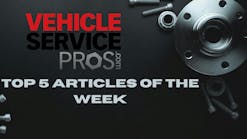Lack of information, education is halting state safety inspection programs
ST. LOUIS, MO — The Automotive Service Association (ASA), ASA-Midwest and the Missouri Alliance of Automotive Service Providers (AASP-MO) held the Second Annual Vehicle Safety Inspection Forum at the Hunter Engineering headquarters in St. Louis, MO on December 2nd to discuss the complicated issues that are currently affecting state safety inspection programs.
Missouri is one of fifteen states that has a safety inspection program. Sergeant Paul Meyer, Major Crash Team Investigator for the Missouri State Highway Patrol; Captain Lester Elder, Director of the Motor Inspector Division for the Missouri State Highway Patrol; Senior Chief MVI Inspector Paul Rehbein; and Steve Hoskins, Administrator of the Motor Vehicle Bureau, Missouri Department of Revenue spoke about their experience with Missouri’s safety inspection program. Jo Jo Heselmeyer, Senior Manager Compliance & Enforcement Services, shared her experience with Texas’s safety inspection program as well.
The panelists and presenters, each with a unique role in the safety inspection program process, addressed the reasons safety programs across the country have received backlash and why the programs are so important. The panelists collectively spoke of three main issues that are harming the programs: consumers are not taking responsibility for maintaining their vehicles and lack general car safety knowledge, legislators are dismissing the program because there is not enough data to confirm its efficacy, and some mechanics are pencil whipping inspections, which undermines the purpose of the program and contributes to low failure rates.
Consumers
Doug Woolverton, Coordinator for Technical Safety Systems, Hunter Engineering, presented on his experience with Colorado’s safety inspection program, which was repealed in 1981. Throughout his presentation, Woolverton discussed the common sense behind the importance of safety inspection programs. He stated, “Common sense is essential. It’s risky to assume that motorists will responsibly maintain their vehicles.” Woolverton explained that in reality, there are three main criteria for motorists: (1) Does it start? (2) Does it run? and (3) Does it stop? This problematic mentality, along with consumers’ general lack of vehicle parts knowledge and safety awareness and the fact that vehicle parts do wear down over time is enough to support the need for safety inspection programs, Woolverton argued.
Legislators
State legislators have dismissed and repealed safety inspection programs across the country (Sixteen states have repealed their programs, the most recent being Mississippi in March.) due to the lack of evidence that proves the efficacy of the programs. Sergeant Paul Meyer and Jade Winfree, Government Accountability Office (GAO) Researcher, both spoke to the issue that car accidents often involve too many variables to conclusively tell if the crash was due to mechanical failure. Additionally, over 90 percent of crashes are caused by driver error, which fuels legislators’ argument that the program is unnecessary.
Winfree presented the main findings of GAO’s report on vehicle safety inspections, which assessed the safety benefits of state programs, the challenges that states have faced in operating the programs, and actions the National Highway Traffic Safety Administration (NHTSA) could take to assist these programs. (to see highlights of the report click here)
Winfree explained, “The impact of safety inspections on vehicle safety is unclear because benefits and costs are difficult to quantify. However, all of the officials in all the states that have inspection programs that we talked to were pretty passionate about their belief that their programs work.”
As the report expresses, GAO recommends that states should collect and maintain better crash data. Winfree commented, “There is no comprehensive data available for all crashes in the United States. Most crash data focuses on fatalities, but fatalities are a small percentage of the overall crashes in the U.S.” Winfree stressed that more crash data is needed to more accurately assess the effectiveness of inspection programs.
JoJo Heselmeyer brought up another faulty argument against safety inspections programs—many legislators argue and many consumers think that safety inspections are unnecessary due to the ever-progressing safety features in cars. Once again reminding the autdience of the common sense importance of inspection programs, Heselmeyer explained, “Legislators tell me, ‘In 2015 we are building better and safer cars.’ You name the safest, well-built car, from the manufacturer’s standpoint, and put bald tires or bad brakes or loose steering on it. Our safety inspection program doesn’t speak to how well the car was built. It speaks to the parts that wear down over time.”
Mechanics
Another problem affecting safety inspection programs is that it’s difficult for the state government to ensure that privately owned shops are doing proper inspections. Paul Rehbein commented, “Mechanics are killing their own program. They want this program, but by not gathering the data properly and not recording each rejection, they’re hurting themselves.”
Mechanics who do not complete thorough inspections are detracting from the program because they are undermining it by passing an unsafe vehicle, and they are contributing to an inaccurate failure rate. Texas’s inspection failure rate is currently 14 percent, which JoJo Heselmeyer says is “way too low.” Legislators see a state’s low failure rate and deem the program unnecessary, thus continuing the vicious cycle.
One Missouri shop owner and inspector who attended the forum offered her perspective on the program. “I became an inspector in 1996. Back then and now I see cars either coming in for inspection or for general repairs that should not be on the roads. Period. I personally think, as an inspector and a shop owner, that we need to crack down on inspectors and inspector stations and hold them accountable, because there are people everywhere who are sliding through,” she stated.
In her response to the shop owner, Heselmeyer summarized the panel discussion with a simple call to action: “It starts with education.” She continued, “Our program is under scrutiny. I’m hoping that conferences like this will start bringing the pieces of us that need to come together to figure out how to shift people’s views. It’s about educating legislators and the public on what it is we’re checking for and why because until we can do that we are going to be constantly defending our program.”


